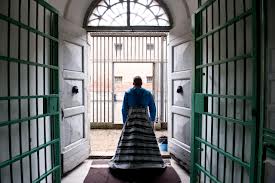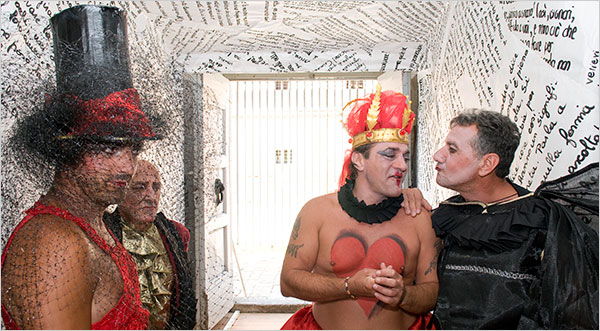I’ve been interested for years in the Italian prison theatre company featured this week in The New York Times. Since 1988, Compagnia della Fortezza, the company named after the Medici-era fortress that houses the Volterra jail where the men are imprisoned, has performed a variety of Italian spectacles and tragedies. From Alice in Wonderland, a Theatrical Essay on the End of a Civilization to Romeo and Juliet: Mercutio Does Not Want to Die, director Amando Punzo has dedicated himself to art behind bars.
This photo is one of many in the photo essay by Clara Vannuci, an Italian photographer who has documented in amazing pictures the essence of Punzo’s vision.

For 21 years, working five hours a day, six days a week, Punzo has embarked on a challenging repertoire for the company, including per the NYTimes in an article they wrote in 2009, “plays based on works by Brecht, Peter Handke, and even the tale of Pinocchio.” He says that it is not therapy that drives him but creating good theatre.
I too felt that way during the eight plays I directed behind bars. The idea was not to go after building self-esteem –although that happened — but to go after revealing the truth of the play and getting the women to be the best they could be at portraying their roles. Punzo says “It’s not about giving the inmates an outlet or a recreational break. It’s work.” The side effect of theatre programs behind bars are self-respect, community building and a love for the stage.
The Italians love art so much, the rumor goes, that the prisons would rather risk an arrest than not show their performances to other Italians. Many shows tour and many prisoners work outside during the day. And believe it or not over half the 205 prisons in Italy have acting companies. Compagnia della Fortezza has won some of Italy’s most prestigious theatre awards and houses a gourmet restaurant where prisoners work and serve food to the public.
A 2009 show — Alice in Wonderland, a Theatrical Essay on the End of a Civilization (photo below)— was loosely based on Lewis Carroll’s masterwork, but the text wove in soliloquies from other authors, in this case Shakespeare (predominantly Hamlet) but also Genet, Pinter, Chekhov and Heiner Müller.

While Punzo, who has an acting background, creates a new play every July, his dream is to create a stable repertory company, with a winter season and a permanent theater, which would allow him to pay the actors. Ah Italy!
Photographer Vannuci relayed in this week’s article how she asked a prisoner why no one tried to escape. The response reflected how much theatre has the potential to change lives: “Why should I run? Where would I go? Twenty years I’ve lived in prison. Now I have something to live for. Life has meaning.”
